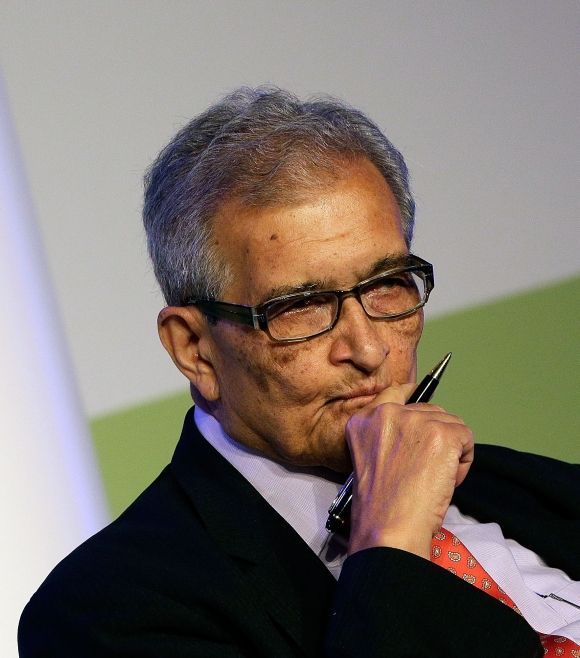 | « Back to article | Print this article |
 For an institution looking to revive past glory, the Nalanda University's initial days have been far from glorious. The university, in the tourist town of Rajgir in Bihar's Nalanda district, could attract only 15 students for its two programmes in the first academic session that began last year.
For an institution looking to revive past glory, the Nalanda University's initial days have been far from glorious. The university, in the tourist town of Rajgir in Bihar's Nalanda district, could attract only 15 students for its two programmes in the first academic session that began last year.
Worse, the controversy around some key appointments and the eventual exit of Nobel laureate Amartya Sen as its chancellor seem to have taken their toll on its performance.
Compared with some other universities founded around the same time, Nalanda's progress so far has been less than satisfactory on most parameters. Besides poor student intake, launch of new courses has been slow, too.
Other universities like Ashoka, Shiv Nadar and OP Jindal Global, by comparison, appear to have moved a fair distance. Enrollments for the two programmes of the Sonepat-based Ashoka University in its first academic session (2014-15) stand at 330. And, given a three-fold increase in the number of applicants for its undergraduate programme, 300 more students are expected to join this year.
The Nalanda University's journey had begun relatively early, with the establishment of a mentor group in 2007. But it took another seven years to start its first academic session with only two courses - undergraduate programmes in historical studies and environment and ecology -- on a makeshift campus. The plan is to add five courses over five years.
In between, there were controversies over a reader at a Delhi University college being appointed Nalanda's vice-chancellor, for a very high salary, besides some other key appointments.
While the government-run Nalanda University has had a rather slow start, corporate-backed OP Jindal University, which commenced operations in 2009, already has student strength of nearly 1,700. The latter runs five schools with programmes in law, business administration, international affairs, public policy and liberal arts and humanities. Law courses seem to be the most popular -- 80 per cent of those joining the university opt for law courses.
A spokesperson for OP Jindal University says: “A total of 111 of students from our first batch were placed across Indian and foreign corporate law firms. Additionally, students also joined independent counsels practising in various high courts and the Supreme Court. The average annual salary for our students placed in corporate law firms was Rs 9.1 lakh.”
Noida-based Shiv Nadar University, another corporate-backed private university founded by the Shiv Nadar foundation in 2011, has seen nearly five-fold increase in its student strength over the last three years. Bachelor of technology in computer science and engineering and BTech in electronics and communication engineering are the preferred courses among students. With a strength of 163 faculty members, the university currently offers 32 courses.
A spokesperson for Shiv Nadar University told Business Standard: “In the coming academic year, we will be offering PhD in chemical engineering, PhD in history and Theatre for Education and Social Transformation, besides post-graduate diploma programmes for working professionals. For the 2015-16 academic year, we also plan to start Masters in Management and Entrepreneurship, in association with Babson College, and Masters in film and television production.”
Even the recently launched Ashoka University has executed its plans faster than Nalanda.
Founded by some top corporate names, the Ashoka University attracted students from Indian Institutes of Technologies, top business schools and other reputed colleges, for its flagship one-year postgraduate multi-disciplinary Young India Fellowship Programme. The batch of 2014-15 saw 197 enrolments for this programme.
“We believe no profession is unidimensional any more. All professions require a multi-disciplinary approach, hence the offering,” says Vineet Gupta, co-founder and pro-vice-chancellor of Ashoka University.
Besides 10 courses, the university runs five centres -- those for political data analysis, writing and communication, leadership, gender studies and entrepreneurship. All students, irrespective of their courses, have access to these centres, says Gupta. Even for students pursuing a particular stream, the course has been structured in a way that he or she learns other subjects as well, he adds.
“Say a student is pursuing a Bachelor of Arts (economics) course. He will have to learn 12 courses in pure economics and 12 courses outside of the subject.”
Nalanda University
Mentor group formed in 2007
First session began in 2014
Only two courses on offer at present (number to increase to five by 2020)
Only 15 students joined the first batch
Op Jindal Global University
Began operations in 2009
Five schools up and running
1,677 students enrolled for various programmes
80% of students pursuing courses in law
Shiv Nadar University
Began operations in 2011-12
First batch had 263 students
Current student strength at 1,500
32 courses on offer; a few to be added this year
BTech in computer science and electronics the most popular courses
Ashoka University
First academic session began in 2014-15
10 courses on offer
Total student strength at 330
Have five operational centres that are open for all students